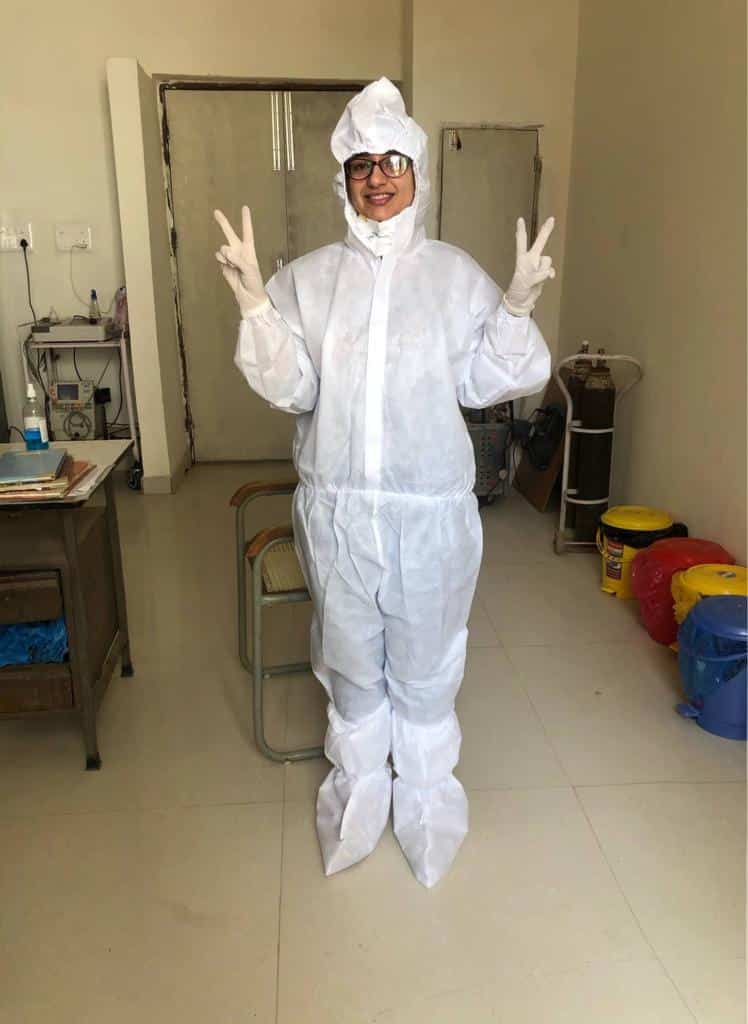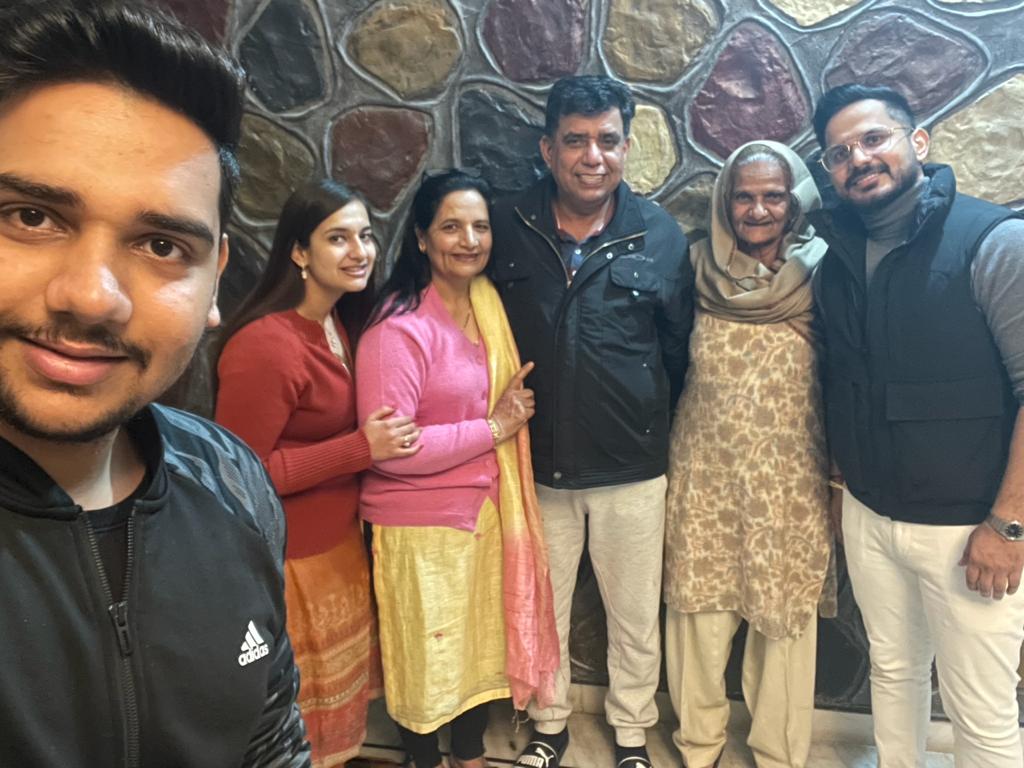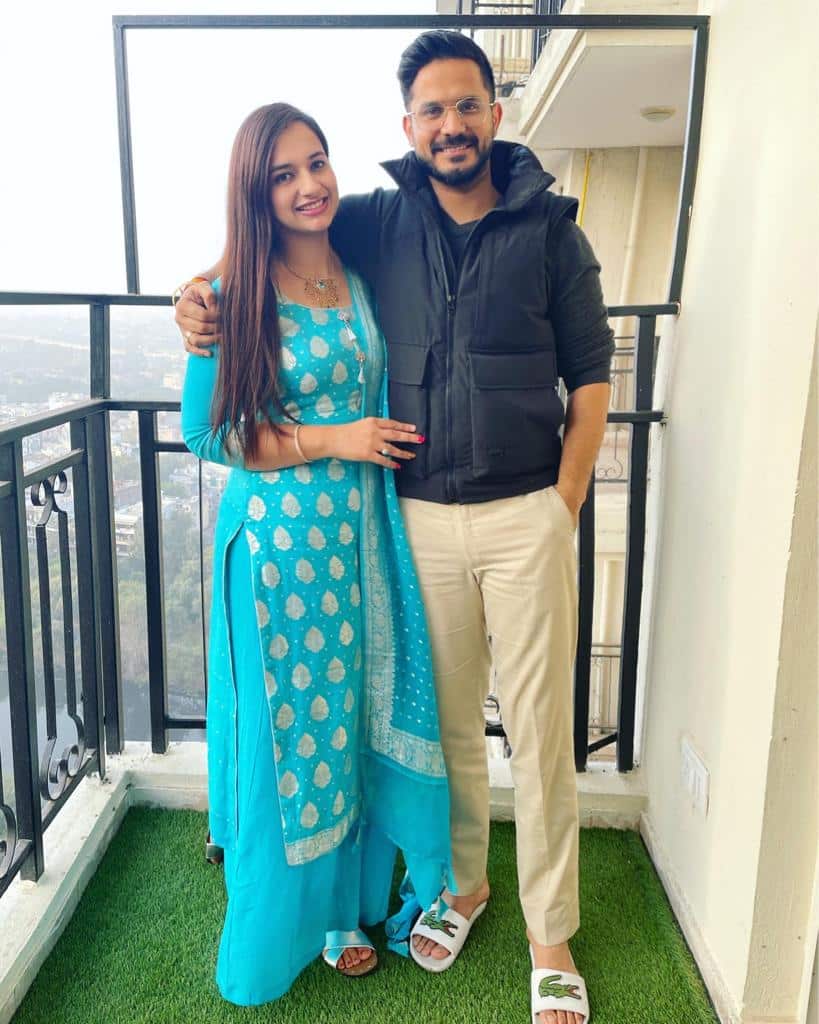Coronavirus has shaken the world completely. In 2020, this unknown enemy alone damaged the world’s economy, wiped out jobs, businesses, infected and killed millions of people. Now, it has come back with new mutations. This second wave is heavily destroying India.
We are in lockdown and still fighting the virus. Our country faces a shortage of vaccines, oxygen, medicines, hospital beds, and many other essential things. The environment is highly hostile even for the people staying inside their houses.
So Hatke Story has brought this ‘Tales of Corona Survivors’ series to spread positivity and awareness among the crowd. We will be featuring social workers, corona patients, doctors, and their families in this series. Only to tell you what is going on the ground.
To add to this series, we connected to Dr. Aprajita Lohan, working in the corona department and researching Black Fungus. In this interview, we will ask her everything about the current scenario and black fungus. Please read it to know more about the disease.
Aashna – Dr. Aprajita, please tell us more about yourself.
Dr. Aprajita Lohan – I’m Aprajita Lohan. I hail from Hisar Haryana, and currently, I’m serving in Covid Care Department in Agroha Hospital. I have completed five years of MBBS and three years of M.S. in Ophthalmology (eye specialization). My exams are still pending, but I have been upgraded to senior residency due to the emergency. Currently, I’m monitoring a corona ward and looking after 12 other patients who are my relatives. I do rounds around the hospital to keep an eye on everybody.
Aashna- Are you receiving only severe patients, or are you treating mild cases as well? What kind of situation is there? What is the current scenario?
Dr. Aprajita Lohan – We admit about 20 patients every day. Due to the shortage of beds, we are not allowing more patients. Typically, a patient is admitted for about five to seven days minimum. We encounter all kinds of patients like mild, moderate, severe, etc. We aren’t admitting asymptomatic and moderate patients. They are sent back to their homes after the necessary treatment. The patients who are sick are kept in the ICU. There are 200 patients in ICU and general wards. We admit 150 to 200 patients per day.
Aashna- How are you guys dealing with the shortage of beds, ventilators, oxygen cylinders, medicines, and staff?
Dr. Aprajita Lohan – I’m leading as a senior doctor, and I have 4 Juniors, four staff members, and four ward boys working under me. It is for one ICU ward. We have 32 patients right now and 40-bed occupancy. Now the condition is much better than in April month. From 20th April till 30th of the same month, there were no beds and no arrangements. Now we have set up another ward space and different ICU spaces.
The hospital has a personal oxygen plant for oxygen, and our director has ties with the district magistrate. Local administration helps us in arranging oxygen. So there is no shortage in our hospital. In April, we were facing it, but now the situation is under control.
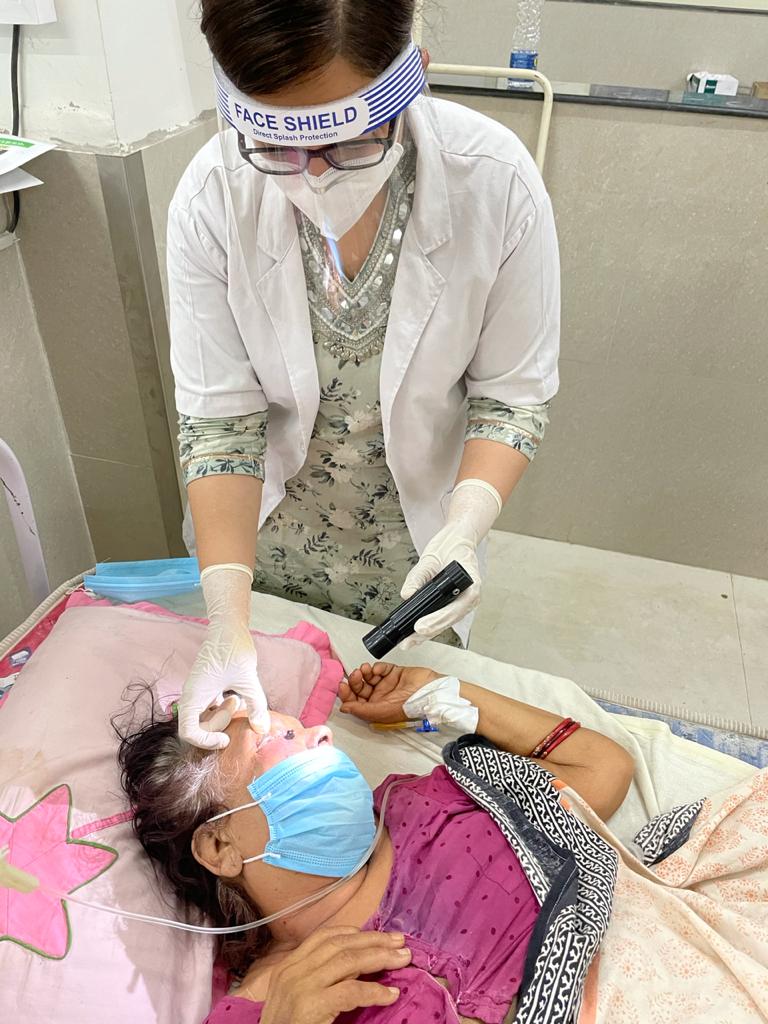
Aashna – Can you tell us what went wrong in April?
Dr. Aprajita Lohan – In April, we faced a lot of problems. Suddenly, the number of patients increased so much, and we weren’t prepared. We had 100 beds, but they were occupied within a time frame of a week. Meanwhile, the cases increased, and the healthcare system was not prepared for it. Being government personnel, you need time to make arrangements, and the cases were drastically increasing at that very moment.
It was the outcome of our negligence and everyone’s relaxed behavior. People had stopped taking precautions. We didn’t have enough oxygen, which was why we couldn’t add more beds to admit new patients. I think oxygen shortage was the leading cause.
Aashna – What kind of preparations did the hospital make to curb the situation?
Dr. Aprajita Lohan – In Agroha, we divided the patients according to the severity of the disease and the stationed people to manage those patients. We separated both general and ICU covid wards and their staff members. People from non-clinical branches, pharma sectors, anatomy, and various places took care of general covid wards. They were appointed to give anesthesia, medicines, and other additionals.
The trained ones from the medical background we placed in ICU to look after severe patients. To meet the oxygen demand, we used the oxygen plant and increased the number of beds. That’s how we managed the situation within a week.
Aashna – How are patients reacting to Coronavirus? Because there has been a backlash against doctors. Patients have stopped believing them. Are you also facing similar situations?
Dr. Aprajita Lohan – Yes, to an extent, we are facing such situations where patients are reacting weirdly. They are saying, ‘I’m not positive. You are just trying to make money. I’ll commit suicide, but I won’t stay here.’
Patients need to undergo an RTPCR and then an eye test for the discovery, but some patients refuse to get it done. Some of them ran away, fearing the tests. They blamed us for messing up with the set of reports.
However, it was happening initially, but things are changing now because the mortality rate is increasing at a higher pace, so they are more concerned about it. Now, they have started believing us.
Aashna- You were researching on Black Fungus. What is your opinion about it?
Dr. Aprajita Lohan – Black Fungus is very dangerous. In my entire career of three years as an ENT, I had only seen three cases of Black Fungus, but during covid, we received 65 cases in a week. It is a topic of significant concern.
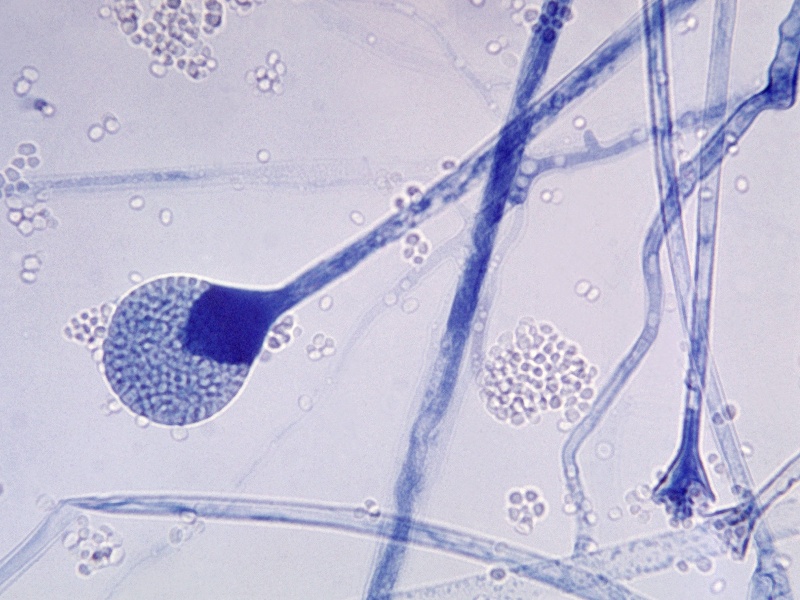
This fungus goes inside your nose and travels through the eyes to reach the brain. Within two to three days, it destroys the eyes and human brain. If the fungus has reached the brain, then it’s tough to save the patient. The mortality rate is 50%. In between, patients lose their eyes and half of their face. Even after losing these parts, there is no guarantee that the patient will survive. So the fungus grows in the nose and leads to erosion of the bones, eyes, and brain.
Aashna- Why are we receiving so many Black Fungus cases? In your opinion, what is the main reason behind this issue?
Dr. Aprajita Lohan – Patients treated on a high dose of steroids have a history of hospitalization, were put on ventilators, and faced oxygen shortage are getting affected by Black Fungus. Here, the medical history of a patient has a significant role to play. Patients with high diabetes, diabetic ketoacidosis, and diabetes on steroids or tocilizumab are at higher risk.
Apart from it, patients suffering from a chronic debilitating illness, taking immunosuppressive drugs or anticancer treatment are likely to get infected by Mucormycosis. However, I feel overuse of steroids, putting dirty or regular water in the oxygen cylinders are the main reasons.
If we talk about the growth of the fungus, then it’s a different process. Because mucor bacteria is present in the nasal passage and mouth, our antibodies fight against it to stop it from developing into Black Fungus. That’s how it stays intact and doesn’t manifest a disease. It is washed away by our immune system.
COVID patients with medical history don’t have antibodies to fight against it because Covid attacked their immune system. They have disruptive mucosa. Due to the overuse of steroids or through contaminated oxygen cylinders, they develop Black Fungus.
Fungus quickly catches things that have moisture, sugar, and a humid environment. Suppose the oxygen pipe had a humidifier. If it comes into contact with the three things mentioned above, the patient can easily catch the fungal infection.
Aashna- How are you treating patients with Mucormycosis?
Dr. Aprajita Lohan – This treatment is quite tedious and involves high risk. However, if the disease is identified early, the fungus can be removed from the nose without damaging other body parts. If it has reached the eye, we are bound to remove eyes or other infected areas. If it has reached the brain, then we go for surgery. However, in this case, the survival rate is only 50%.
For treatment, we put patients on antifungal drugs, but they are very toxic. We do not have enough Amphotericin B liposomes. The drug costs 6000 rs per file, and the patient needs 2 to 3 files per day, and this treatment is given for three to six weeks. It’s a considerable amount to pay for the medicine. So we have opted for another medicine that costs 400 to 500 per file. The patient requires one file per day for three to six weeks.
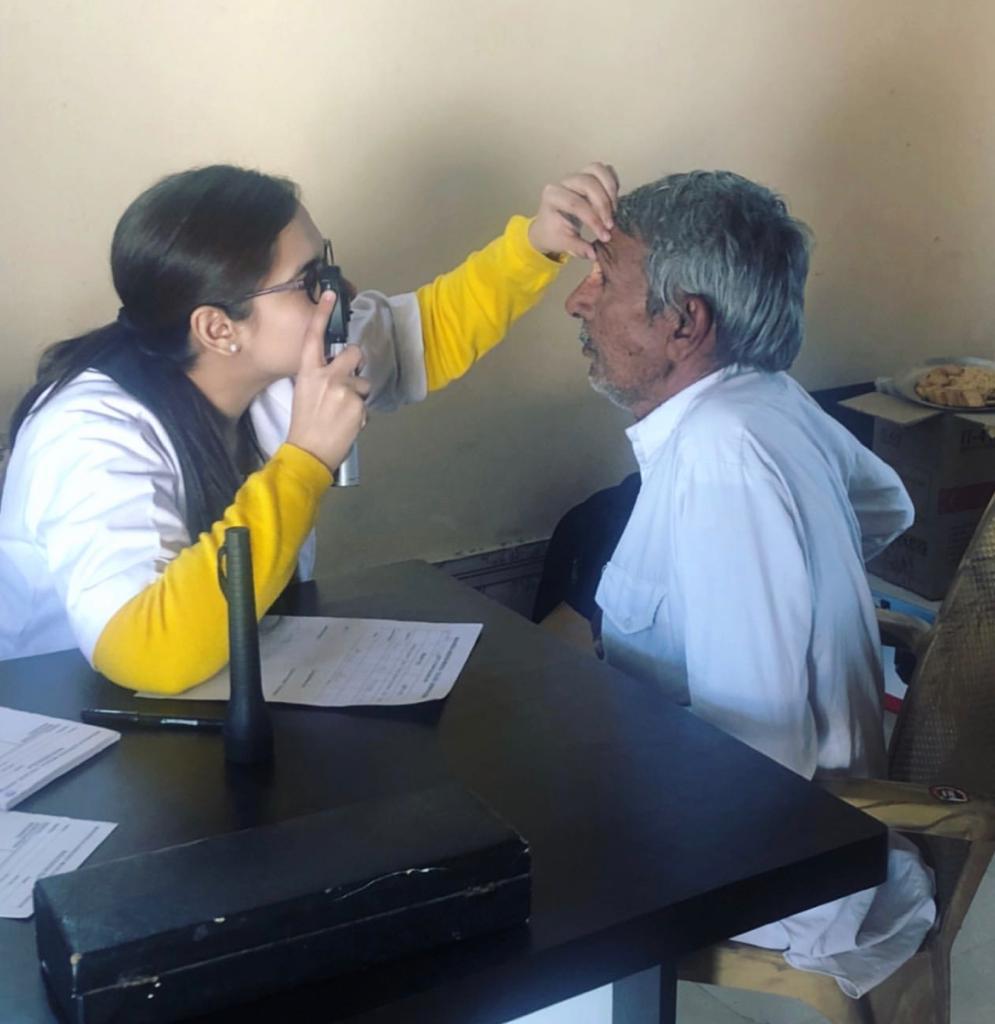
For diagnosis, a patient has to undergo the Amphotericin Test, MRI, and CT Scan. For treatment, we focus on controlling blood sugar levels and managing the use of steroids. It can be treated with antifungal medicines if diagnosed on time. Otherwise, surgery will be performed. Surgery needs a team that includes a disease specialist, microbiologist, histopathologist, ENT specialist, ophthalmologist, surgeon, dentist, and other staff members.
Aashna- What are the initial symptoms of Black Fungus? How can patients identify it at an early stage?
Dr. Aprajita Lohan – Drooping eyelids, diminishing vision, swelling in eyes, bleeding nose, or black discharge are the most common symptoms. Blurred or double vision, orbital pain, headache, toothache, loosing of teeth, dysfunction in jaw movement, Paresthesia or abnormal sensation in the skin, loss of vision in one or both eyes. Complete or partial blindness are severe symptoms. In the Post COVID recovery period, if a patient notices non-movement of the eyeballs, numbness on one side of the face, and loss of smell, it can be Black Fungus.
Aashna- Is Black Fungus a transmitted disease, or is it only restricted to the patient? Can it affect a healthy person?
Dr. Aprajita Lohan – No, it’s not communicable. That means it is restricted to the patient. It’s improbable to develop Black Fungus because it’s a sporadic disease. So it’s not a wave of Black Fungus. If you are healthy and not affected by Coronavirus, then you will not get it. Even as a Corona patient, catching Black Fungus is meager and falls under the abovementioned terms and conditions.
Aashna- Are low or high blood pressure patients at high risk?
Dr. Aprajita Lohan – No, they aren’t. Only diabetic patients are vulnerable to it. However, they can develop it due to overuse of steroids or through wrong oxygen cylinders.
Aashna- What are precautions that diabetic patients must take to avoid black fungus?
Dr. Aprajita Lohan – They have to increase the doses of insulin or whatever oral hypoglycemic drugs they are using. Sugar levels must be below 200. It is the main precaution we are advising to all the COVID recovered patients. If you still take steroids as prescribed, monitor them. Steroids are like the first drug advised but don’t take it without a doctor’s advice. You may feel better after consuming steroids, but they can be very harmful to the body.
Aashna- If steroids are that harmful, then why is the government not banning the use of steroids?
Dr. Aprajita Lohan – Because steroids help in alleviating Coronavirus. The use of steroids is not a problem, but overuse of steroids is an issue. We use them because covid patients feel inflammation in the body, and steroids reduce the inflammation. We have to use steroids to control COVID.
If a patient is advised steroids, we mostly ask the patient to take it for five to seven days, but some take it for 14 to 20 days. That’s overuse. Apart from it, people aren’t consulting their doctors before consuming steroids. They are taking advice from their friends and relatives. That’s the main reason why we are dealing with something as dangerous as Black Fungus.
Aashna- Recently, ICMR and the government banned the use of Remdesivir. What is your opinion about it? Was it a necessary decision?
Dr. Aprajita Lohan – Remdesivir was a marketing gimmick. Pharma companies projected the medicine as some magic drug for covid, which wasn’t true in any sense. Remdesivir only helped in a few exceptional cases. Apart from it, the medicine had no other benefits, and it was creating havoc in the public domain. Black marketing was full-on swing. People were selling it for 20 to 30 thousand rupees whereas the drug cost was only 600 rupees.
Even after giving Remdesivir, we were not able to save many patients. It worked as a blood thinner, not as a magic wand. What’s the point in spending so much money and not saving the patient’s life? So in my view, it was a wise decision and need of the hour.
Aashna- Cases of White Fungus are also on the rise? What is White Fungus? Is it more dangerous than Black Fungus?
Dr. Aprajita Lohan – White Fungus results in UTI and other uterus or urinary infections. It affects body parts like lungs, nails, skin, stomach, kidney, mouth, uterus, and brain. However, it was familiar and already present in the human body before Covid-19. It’s not as lethal as Black Fungus. It can be cured if the correct treatment is given.
Aashna- What is your take on vaccines?
Dr. Aprajita Lohan – The vaccine is a shield against Coronavirus. According to my experience, I’ve seen vaccinated patients recovering earlier than non-vaccinated patients. Their infection is mild and easily treatable. However, exceptions are also present. Fully vaccinated patients have also lost their lives while fighting covid. However, these cases are less in number. So I support and promote vaccination.
Aashna- Is Coronavirus damage permanent? Does it affect lungs after recovery as well?
Dr. Aprajita Lohan – Yes, that’s true. Even if you had mild covid, some of the infiltrations would be present in your lungs. It can be removed later by antibodies and the immune system. If the symptoms were severe, then white patches appear in the x-ray and CT-Scan, and that’s the permanent damage.
Aashna- How are you dealing with stress? How is Covid affecting your personal life and mental health?
Dr. Aprajita Lohan – Honestly, it’s challenging to be a doctor at this time. Health workers are also suffering. We are putting our lives. Wearing a PPE kit daily itself is the biggest challenge for us. Covid infected me, but my infection was mild. I wasn’t vaccinated that time, and I recently recovered. Now, I’m back on duty.
My grandmother, uncle, mother, aunt were found positive in April month. Except for my aunt, everyone was admitted to Agroha. I was looking after everyone. I would wake up every half an hour to look after my family. Sometimes, I’d only sleep for three hours. So it’s too stressful.
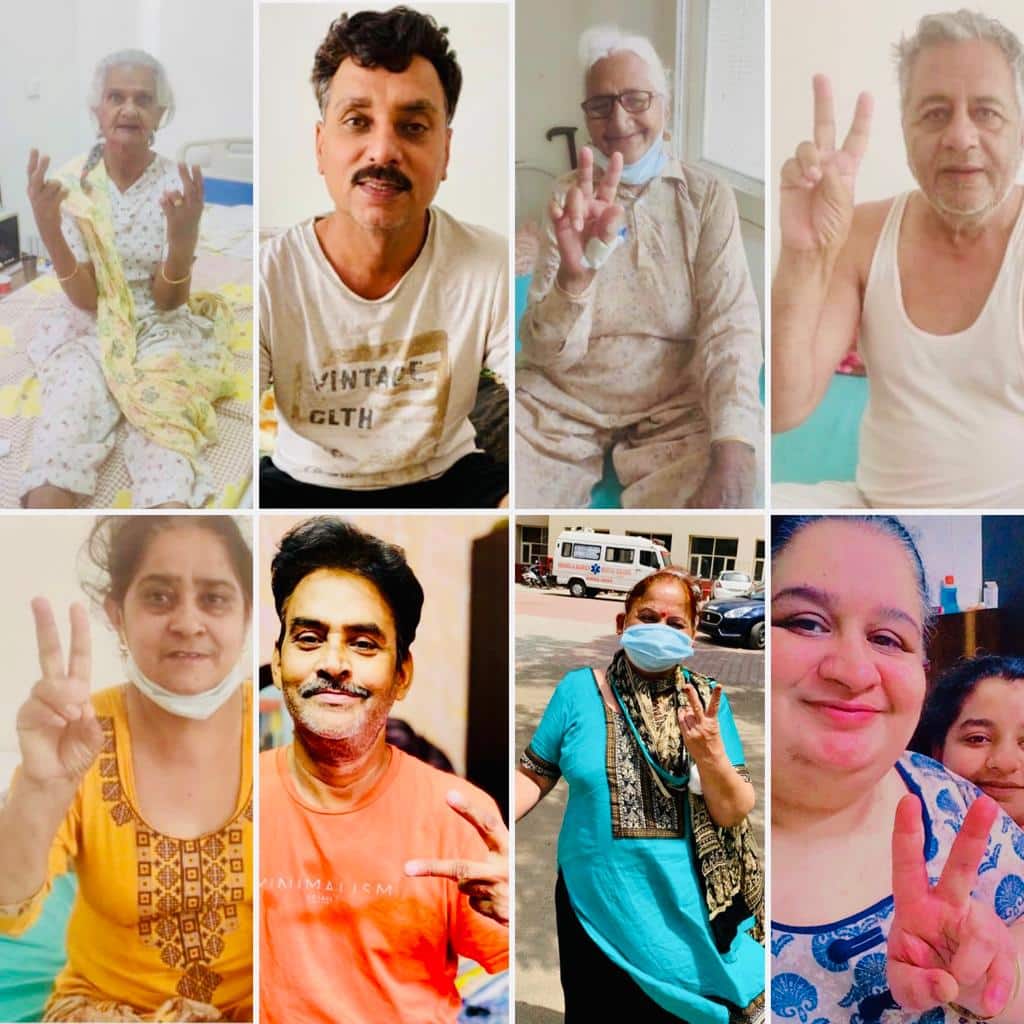
Despite trying a lot, I couldn’t save my aunt. She died, and I couldn’t do anything to help her. It is highly traumatic. Some patients don’t understand our plight. Instead, they blame us for putting them in this condition.
Continuously being in the ICU, seeing people dying, and struggling to breathe is a real trauma for our mental health. My family, in-laws, and husband all motivate me to work harder and with patience. Sometimes I do feel like giving up, but they encourage me to continue. So my family is my strength.
Aashna- What do you want to tell others?
Dr. Aprajita Lohan – I’d say please trust your doctor. We are trying very hard to cope up with the situation. Do not rely on people’s advice. Your doctor is telling you the truth. Especially if you are admitted to a government hospital. We have no reason to cheat. So please listen to them and support each other. Talk about Black Fungus in your family. People don’t know much about it. We need to spread awareness.
We thank Dr. Aprajita Lohan for connecting with us. For more details, visit her YouTube channel or Instagram account.
Youtube – https://youtu.be/NYh3Jm_Eo1E
Instagram – https://instagram.com/dr.aprajitalohan
Like us on FB, if you find our content interesting: https://www.facebook.com/hatkestoryofficial/
Do you have an interesting incident or experience to share with the world? Write to us, and together we can discuss how to weave your story and present it to the world. Would you mind sending us your story?







